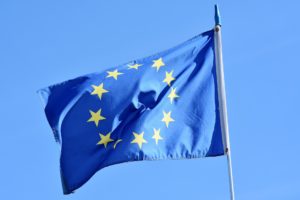Highlights from the Past Week
CW 17 / Monday, 25 to Thursday, 28 April: Political Group and Committee Meetings Week (Brussels);
COPYRIGHT – ECJ CONFIRMS ARTICLE 17 OF THE DSM DIRECTIVE: On Tuesday, the Court of Justice of the European Union (ECJ) delivered its much awaited judgment in Case C-401/19 – Poland v Parliament and Council (judgment, abstract, press release – PDF). This concerned preventive measures required by Article 17 of the DSM Directive on Copyright (DSMD) in light of the right to freedom of expression and information recognised in Article 11 of the Charter of Fundamental Rights of the European Union.
The ECJ judgment, which dismissed the case, acknowledged the likely need for automated tools to conduct the kind of content reviews “de facto” required by Article 17 DSMD, but also recognised the potential infringement on users’ freedom of expression and information.
The Court concluded that the obligation on the providers to review, prior to its dissemination to the public, and the content that users wish to upload to their platforms, resulting from the specific liability regime established in Article 17(4) DSMD, has been accompanied by appropriate safeguards by the EU legislature in order to ensure respect for the right to freedom of expression and information of users, and a fair balance between that right, on the one hand, and the right to intellectual property, on the other. It is the task of the Member States, when transposing Article 17 of that directive, to take care to act on the basis of an interpretation of that provision which allows a fair balance to be struck between the various fundamental rights protected by the Charter. Furthermore, when implementing the measures transposing that article, the authorities and courts of the Member States must not only interpret their national law in a manner consistent with that article but also make sure that they do not act on the basis of an interpretation of the article which would be in conflict with those fundamental rights or with the other general principles of EU law, such as the principle of proportionality.
The ruling does not seem to block companies from using upload filters, analyzed Prof. Dr Eleonora Rosati, Director of the Institute of Intellectual Property and Market Law (IFIM) and Co-Director of the LLM in European IP Law at Stockholm University. However, the ECJ lays out some restrictions, highlighting that filters have to “adequately” distinguish between illegal and legal content to respect free speech. Advocate General Øe suggested last year that online platforms should only use filters detecting and blocking a whole song or film, and not extracts, which could be legal to use depending on whether they are parodies, memes or quotes.
Prof. Rosati explained that the most important aspect of the ruling was “that the CJEU has held blocking of lawful content disproportionate and, thus, illegal”.
This would be “a key clarification, as it rules out the possibility that content is blocked ex-ante and then reinstated only ex-post, after a complaint is resolved”.(see also Recital 86 of the judgment)
In another initial analysis of the ECJ ruling Dr João Pedro Quintais, IViR, Amsterdam University, concludes that: “In sum, from this first quick analysis, it can be said that although Article 17 survives, its validity is subject to the strict application of safeguards that ensure the right to freedom of expression and information of the users of [online content-sharing service providers]. In particular as regards permissible filtering measures, the Court mostly follows the AG Opinion, with much less detail. And, as is well known, the devil is in the detail. For instance, the Court was cautious to omit any concrete guidance on permissible filtering as regards categories such as ‘manifestly infringing’ or ‘earmarked content’. However, reading this judgment side-by-side with the AG Opinion, it is likely that the Court endorses the AG’s rejection of the permissibility of filtering of ‘earmarked’ content that is not also ‘manifestly infringing’.”
It is to be expected that those EU Member States that have not yet done so will need to introduce extra safeguards in their domestic copyright rulebooks in order to either fix or implement Article 17 DSMD with the European Court of Justice’s ruling in mind. (see inter alia Euractiv)
EU-US TTC – DRAFT JOINT DECLARATION: Contexte (paywall, FR) has published the draft joint declaration to be adopted after the second meeting of the “EU-US Trade and Technology Council” in Paris-Saclay on 16 May (PDF).
The document consists of a general statement reaffirming the importance of the transatlantic partnership and ten annexes drafted by specialist working groups. The latter specify the joint ambitions of Brussels and Washington in various topical areas. The authors emphasise their common desire to secure supply chains, reiterate the importance of semiconductors for the global economy, and highlight the need to cooperate in combatting disinformation (especially Russian). They also stress the importance of being able to control foreign investment while maintaining an open trade framework. The “Trade and Technology Council”, established in autumn 2021, provides a new framework for exchange and cooperation on regulatory and retail issues.
The European Commission announced last week the establishment of a similar Council with India.
NIS2 – FRANCE STRIVES FOR AGREEMENT: The French Presidency of the Council is keen to reach an agreement on the NIS2 Directive in the next political trilogue on 12 May. Numerous technical meetings are taking place in preparation for the trilogue, and France has already made a significant concession regarding reporting deadlines (see below). The Presidency seems to be convinced that an agreement cannot be reached without including regional administrations in the scope, but Germany has strongly opposed that until now. Other key contention points include the peer review mechanism, cybersecurity certification and the exclusion clause.
The compromise text is based on the Parliament’s position and requires that a cyber attack or ransomware that compromises the availability of an essential service be reported within 24 hours. For any other incident such as the confidentiality of a network or the integrity of the data in possession of the organisation, the deadline would be 72 hours. Moreover, the Parliament obtained that a final report would have to be submitted one month after the formal notification of the incident. If after one month the incident is still ongoing, there would need to be a provisional report to be complemented by a final report once it has ended. At the same time, the EU countries obtained that the notification in itself does not affect the liability of the impacted organisation. (see Euractiv)
EPRIVACY – SIPPEL URGES CLOSURE: Euractiv reports that significant progress has been made on the negotiations on the ePrivacy Regulation, with Chapters I and III virtually closed. Rapporteur Birgit Sippel publicly called out to the French Presidency to organise at least two technical meetings per month and another political trilogue before the end of June.
Next on the agenda is the infamous Chapter II, which includes the most controversial parts of the proposal, such as the cookie provisions.
POLITICAL ONLINE ADVERTISING – EP COMPETENCES CONFIRMED: The European Parliament’s Internal Market Committee (IMCO) will be the lead committee for the regulation on political advertising (rapporteur S. Gozi, Renew). This was confirmed by the political group chairs at their meeting last Thursday, when they endorsed the solution proposed by the Conference of Committee Chairs. The Committees on Culture (CULT) and Civil Liberties (LIBE) will be involved with exclusive and shared competences.
LIBE has been assigned an exclusive competence for Articles 12, 15 and 16 and shared competences for Articles 1, 2, 7, 9, 12 (points 3 to 8) and 13 with Annex 2. CULT has been assigned shared competence for Articles 2 (points 2 and 11), 7 and 16, as the regulation may affect advertising for media, including audiovisual broadcasters and newspapers.
The first meeting of the Single Market shadow rapporteurs is scheduled for 10 May. (see Contexte, Paywall, FR)
CSAM – COMMISSION STICKS WITH PROPOSAL: At an Internet Watch Foundation (IWF) event last week, a senior EU official defended the proposal to combat child abuse content on the Internet, expected on 11 May: “I think today we’re at about half [of the Commission’s proposals] that get rejected at that abstract stage in the first step and then reevaluated”, said Cathrin Bauer-Bulst, head of unit for the fight against cybercrime and child sexual abuse. She was referring to the proposal which was initially rejected by the Regulatory Scrutiny Board and which subsequently received approval with reservations.
“The general monitoring obligation, obviously, is one of the key aspects that we’ll have to reconsider here”, Bauer-Bulst said. “In fact, because of the important interests and rights of all sides, the European Commission has considered that it’s probably appropriate to go for a limited set of obligations rather than leaving things to a purely voluntary approach”, Bauer-Bulst added, going on to say that the work would require “a very careful balancing process against the general monitoring obligation prohibition but also against all sorts of other rights and interests that come together”.
Bauer-Bulst also gave more insights into what can be expected from the future European centre tasked with fighting child abuse.“The centre will have the responsibility of reviewing the reports coming in from service providers and to make sure that there’s a swift follow-up”, she said. The organisation could have an EU-wide database of digital fingerprints of images identified as illegal under EU law; the so-called hashes allow companies to detect and remove such problematic content faster. A victim of abuse could also potentially request the centre to hunt down illegal images going around and request that companies remove them. (see Politico Pro, Paywall)
PRODUCT SAFETY – IMCO VOTE ON REGULATION POSTPONED: The vote on the EU Product Safety Regulation has been postponed by a month after legislators complained that there was too little time to discuss controversial parts of the rules. According to an updated IMCO schedule, the committee will vote on the regulation on 15 and 16 June.
MEPs, including R. Repasi (S&D, DE) and K. van Sparrentak (Greens, NL), had previously complained at a hearing on 21 April about the pressure and haste with which the parties were trying to reach an agreement before the vote in mid-May.
OPEN AND SECURE INTERNET – EU SIGNS JOINT DECLARATION WITH INTERNATIONAL PARTNERS: Last week, the EU, the U.S. and several international partners signed a Declaration for the Future of the Internet. “The Internet has brought humanity together, like never before in history. Today, for the first time, like-minded countries from all over the world are setting out a shared vision for the future of the Internet, to make sure that that the values we hold true offline are also protected online, to make the Internet a safe place and trusted space for everyone, and to ensure that the Internet serves our individual freedom”, said Commission President Ursula von der Leyen. “Because the future of the Internet is also the future of democracy, of humankind.” (see press release COM)
RT AND SPUTNIK – GERMAN FEDERAL NETWORK AGENCY SUPPLEMENTS BLOCKING LIST: Last week, the German Federal Network Agency (BNetzA) again supplemented the list of domains to be blocked on the basis of EU Sanctions Regulation No. 2022/350. The following addresses have been added:
- rt.com
- rtde.live
- rtde.website
Relevant Publications, including from the EP Think Tank:
- Policy Departments’ Monthly Highlights – May 2022 (At a Glance)
- What if AI regulation promoted innovation? (At a Glance)
- Investigation into the potential of artificial intelligence in the digital age (At a Glance)
- The future of data protection and privacy: How the European Parliament is responding to citizens’ expectations (Briefing)
- Important projects of common European interest: State of play (Briefing)
- Digitalisation of cross-border judicial cooperation (Briefing)
- Improving working conditions in platform work (Briefing)
Outlook for the Current Week
You can find a list of the upcoming dates of the European Parliament here, as well as an overview of the plenary sessions week. The meeting calendar for 2022 can be found here (PDF).
A debate and vote on the AI Special Committee’s report is scheduled for Tuesday morning. Meanwhile, the debate on the report on the common chargers and the vote on this report have once more been dropped out of the agenda. On Wednesday afternoon, the Pegasus software will be discussed in plenary.
An overview of the most important dates of the Council week can be found here, the meeting calendar is accessible here, and the list of the main topics for the coming fortnight is available here, while an indicative calendar of meetings of the French Presidency Council can be found here (PDF).
Included among these dates are:
Summits and Ministerial Meetings:
- Transport, Telecommunications and Energy Council (Energy), Monday, 2 May;
- Informal Video Conference of Economy and Finance Ministers, Tuesday, 3 May – Background Brief;
Preparatory Bodies:
- Working Party on Cooperation in Criminal Matters (COPEN), Monday, 2 May, Tuesday, 3 May, Thursday, 5 May and Friday, 6 May;
- Working Party on Tax Questions (Indirect Taxation), Monday, 2 May;
- Working Party on Telecommunications and Information Society, Tuesday, 3 May and Thursday, 5 May;
- Horizontal Working Party on Cyber Issues, Tuesday, 3 May;
- Working Party on Intellectual Property, Tuesday, 3 May;
- Working Party on Competitiveness and Growth (Industry), Tuesday, 3 May and Thursday, 5 May;
- Working Party on Consumer Protection and Information, Friday, 6 May;
- Working Party on Tax Questions (Direct Taxation), Friday, 6 May;
- COREPER I (incl. DMA), Monday, 2 May, Wednesday, 4 May and Friday, 6 May;
- COREPER II, Wednesday, 4 May and Friday, 6 May;
Information on the weekly commission meeting can be found in the preview (PDF) or (at short notice) in the current agenda. Topics of particular relevance include the legislative proposal against child abuse (most recently postponed again from 27 April to 11 May) and the Media Freedom Act (29 June).
The following topics are on the agenda for the coming week:
- Renewed strategic partnership with the outermost regions
- European health data space
You can find the judicial calendar of the ECJ here. On Monday, the hearing in Google’s case against the EU Commission’s fine for market dominance in the online advertising market (“AdSense”) will take place (T-334/19).
European Parliament Committees
CW 18 / Monday, 2 to Thursday, 5 May: Plenary Sessions Week (Strasbourg);
LIBE Committee (EP)
Current Meetings
- None
Further Meetings (Calendar)
- 11 May 2022, 9.00-12.00 and 13.45-15.45 (Brussels)
- 12 May 2022, 9.00-12.00 and 13.45-15.45 (Brussels)
JURI Committee (EP)
Current Meetings
- None
Further Meetings (Calendar)
- Tuesday, 17 May 2022 (Brussels)
Dossiers Timetable (11 April 2022)
ITRE Committee (EP)
Current Meetings
- None
Further Meetings (Calendar)
- Monday, 16 May2022, 13.45-15.45 and 16.45-18.45
- Tuesday, 17 May2022, 9.00-12.00 and 13.45-15.45 and 16.45-18.45
Dossiers Timetable (26 April 2022)
IMCO Committee (EP)
Current Meetings
- Monday, 2 May 2022, 20.30-20.45 (Strasbourg)
- Tuesday, 3 May 2022, 12.15-12.30 (Strasbourg);
Excerpt from the Draft Agenda
The agenda contains no topics of particular relevance for the Internet industry.
Further Meetings (Calendar)
- Monday, 16 May 2022, 13.45-16.15 (Brussels)
- Tuesday, 17 May 2022, 9.30-11.30, 11.30-12.30, 13.45-16.15 and 16.45-18.45 (Brussels)
Dossiers Timetable (April 2022)
CULT Committee (EP)
Current Meetings
- None
Further Meetings (Calendar)
- Tuesday, 17 May 2022, 9.00-12.00 and 13.45-15.45 (Brussels)
Further Scheduled Parliamentary Calendar Dates
- CW 19 / Monday, 9 to Thursday, 12 May: Committee Meetings Week (Brussels);
- CW 20 / Monday, 16 to Thursday, 19 May: Mini Plenary Sessions Week (Brussels);
- CW 21 / Monday, 23 to Friday, 27 May: Green Week (no meetings);




